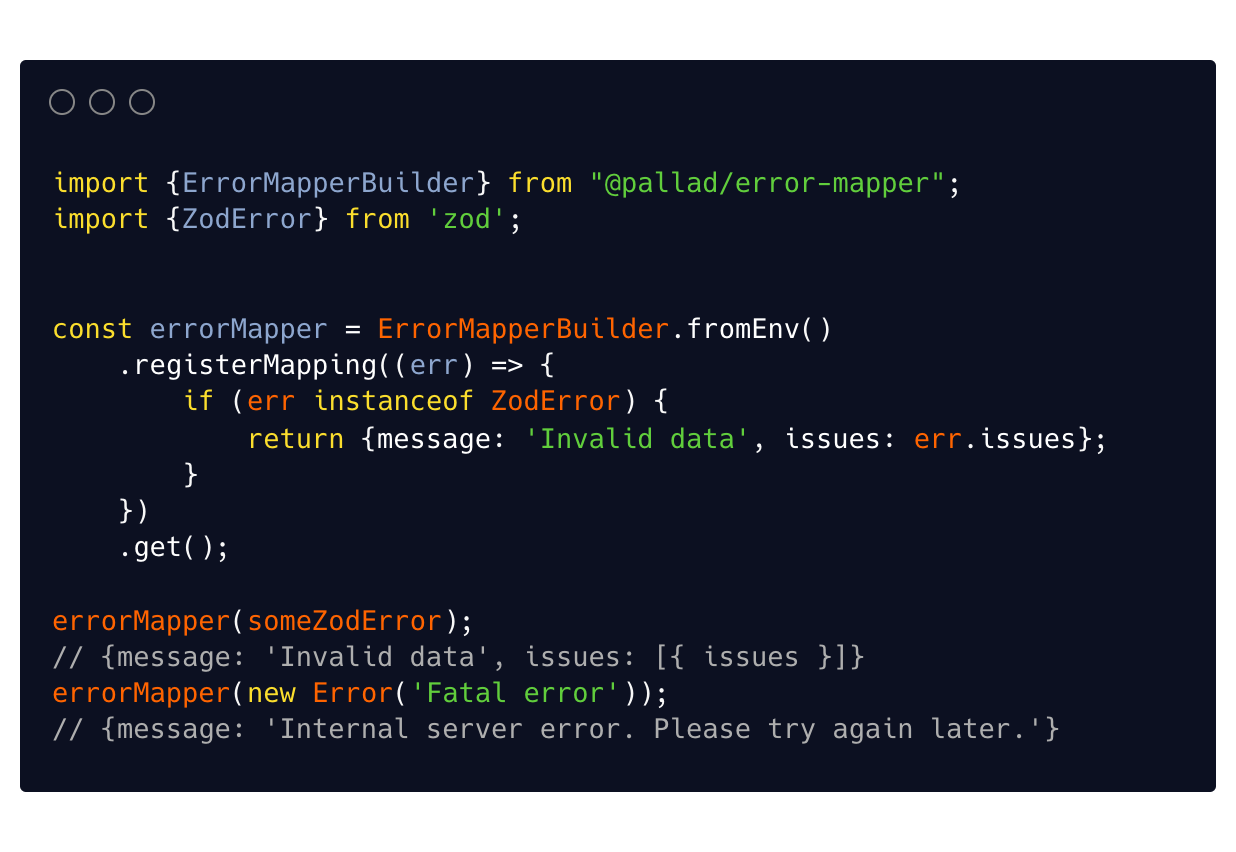@pallad/error-mapper v1.1.1

Installation
npm install @pallad/error-mapperProblem
Whenever errors from application are caught you need to represent them properly in the response. For example HTTP status code needs to represented, you need to decide whether to include stack trace, how about errors that are not thrown from your application directly but another library?
While it sounds simple this turns out to be a problematic for many.
Solution
Have a set of rules that defines how certain error should be represented.
error-mapper helps with that by providing options map error to desired output in composable way, handle unknown
errors, hide error message for them depending on environment, displaying stack for development environments, allowing to
listen on unknown errors, globally format output.
Usage and how it works
Simple example
const errorMapper = ErrorMapperBuilder.fromEnv()
.registerOutputTransformer((output, error) => { // decorates final output
if (error instanceof Error) {
return {...output, name: error.name}
}
return output;
})
.registerMapping(error => { // decides how error should be represented
if (error instanceof ValidationError) {
return {
message: 'Invalid data',
violations: error.getViolations(),
statusCode: 400
}
}
})
.get()
app.use((err, req, res, next) => {
const {statusCode, ...rest} = errorMapper(err);
res.status(statusCode ?? 500)
.json(rest)
})ErrorMapping is a function that receives an error and decides whether can handle it by returning desired output.
For example you might want to return validation errors or extra details about NotFound error.
ErrorMapperBuilder.fromEnv()
.registerMapping(error => {
if (error instanceof ValidationError) {
return {
message: 'Invalid data',
violations: error.getViolations() // extract validation errors like "name is too long"
}
}
})
.get()OutputFormatter is a function that receives output from a mapper (or default output if no mapper registered) and
transforms it.
This is a good opportunity to decorate output regardless of mappers.
For example you might want to populate name of the error.
ErrorMapperBuilder.fromEnv()
.registerOutputTransformer((output, error) => {
if (error instanceof Error) {
return {...output, name: error.name}
}
return output;
})
.get()Whenever final mapper gets called, error mappers are invoked in registration order until the one that is able to handle the error returns an output. The output then gets formatted by registered output transformers and returned.
error-mapper has no idea what to do with created output and you are responsible to do whatever is needed to properly
represent data.
app.use((err, req, res, next) => {
const {statusCode, ...rest} = errorMapper(err);
res.status(statusCode ?? 500) // use statusCode
.json(rest) // and display the rest
})Creating error mapper
First you need to decide whether you want to configure it manually via constructor
const errorMapper = new ErrorMapperBuilder({
showStackTrace: false,
showUnknownError: false
})
.get()Or preconfigured it based on detected environment.
const errorMapper = ErrorMapperBuilder.fromEnv()
.get()In this case stack trace and unknown errors are visible only for test and development environments (determined
by @pallad/app-env)
Conditional configuration
error-mapper extends @pallad/builder which allows to easily configure
the builder without breaking chaining.
ErrorMapperBuilder.fromEnv()
.runIf(process.env.ERROR_DISPLAY_NAME === '1', (builder) => { // shouldDisplayName
return builder.registerOutputTransformer((output, error) => {
if (error instanceof Error) {
return {...output, name: error.name}
}
return output;
})
})Showing stack trace
stack is returned only if option showStackTrace is set - default false.
When ErrorMapperBuilder.fromEnv is used then it is set to true for development and test environment (determined
by @pallad/app-env).
import {ErrorMapperBuilder} from '@pallad/error-mapper';
const errorMapper = new ErrorMapperBuilder()
.setOptions({showStackTrace: true})
.get()
const result = errorMapper(new Error('test'))
/**
* {stack: 'Error: test\n at REPL6:1:1\n at Script.runInThisContext (node:vm:129:12)'}
*/Showing unknown errors
By default unknown error (the one that has no mapper) is displayed only for development and test environment (
determined
by @pallad/app-env).
Unknown error message (the one that has no mapper) is returned only if option showUnknownError is set -
default false.
When ErrorMapperBuilder.fromEnv is used then it is set to true for development and test environment (determined
by app-env).
If set to false then message "Internal server error. Please try again later." is returned instead of original error
message.
import {ErrorMapperBuilder} from '@pallad/error-mapper';
const errorMapper = new ErrorMapperBuilder()
.setOptions({showUnknownError: true})
.get()
errorMapper(new Error('Test error message'))
/**
* {message: "Test error message"}
*/
const errorMapper2 = new ErrorMapperBuilder()
.setOptions({showUnknownError: false})
.get()
errorMapper2(new Error('Test error message'))
/**
* {message: "Internal server error. Please try again later."}
*/Callback on unknown errors
If none or registered mapping is able to handle the error you can optionally listen to them. Listener has no effect on produced output.
const mapper = ErrorMapperBuilder()
.onUnknownError(error => {
console.error('Fatal error we do not know how to handle', error);
})
.get()FAQ
Type of error is of type unknown. Why is that?
While it is common sense to type it as Error but javascript can throw almost anything, even raw strings. In practice
turned out that not everything has to be an Error. Moreover unknown forces you to perform proper type checks.
